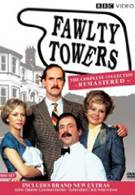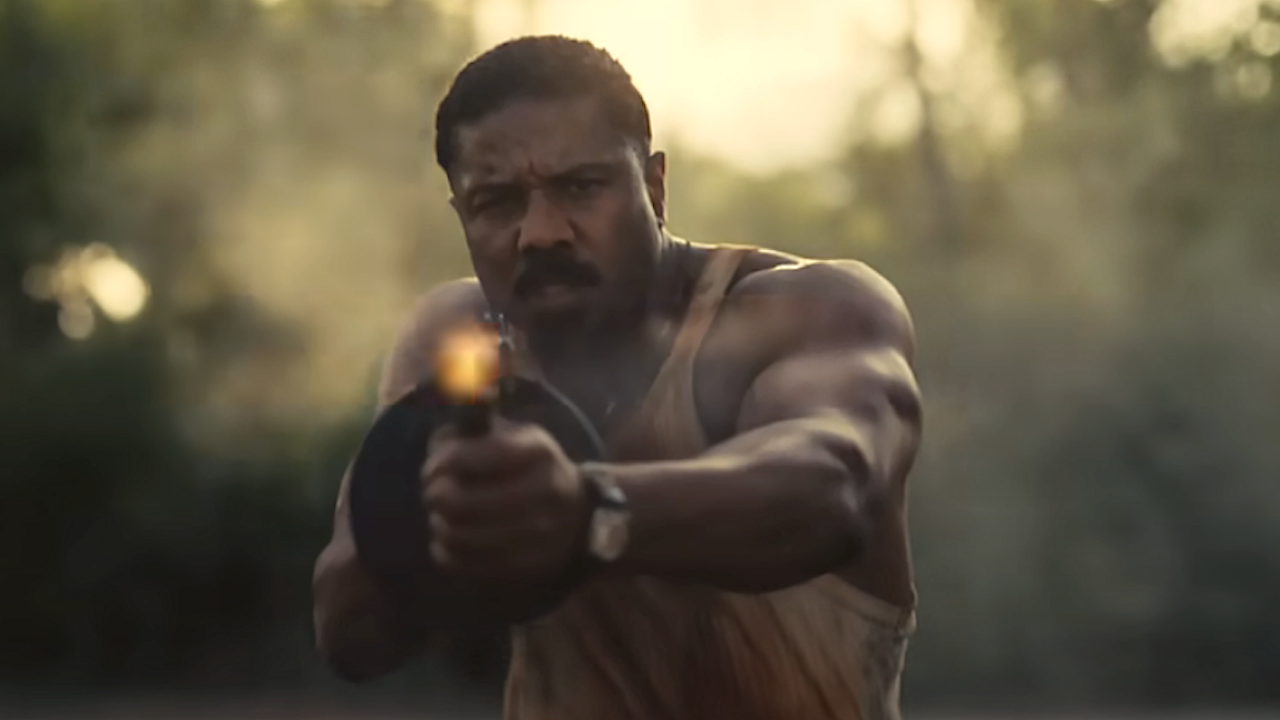I can't possibly say anything about the legendary Fawlty Towers that hasn't been said before, so you're better off putting the DVD on and getting the news straight from the source. The show consistently tops favorites lists, as does its central character, Basil Fawlty, the manic man-child of a hotel owner created by the iconic John Cleese. The fact that Cleese currently dead-ends his career in broad Hollywood bombs is all the more perplexing with each re-viewing of the masterworks he put out in the prime of his career. The man knew how to write extremely witty comedy that never sells itself short, and he was a firm believer in brevity. He opted out of Monty Python's Flying Circus before its fourth season, and kept Fawlty Towers to a mere 12 episodes. Perhaps in further seasons, Basil's kid cousin Ollie would have moved in, and the gang would have moved to a beach house and had a different guest star every week, but I doubt it. Though the content will never refresh itself with further episodes, there's no better way to capture what's already there than the updated DVD set out from the dependable BBC Video. I don't know what career would be most suitable for Basil Fawlty, but it's certainly not that of customer service. Perhaps as a jailer, with more gray areas in terms of violent acts toward guests in his facility. When he's not funneling dissatisfied rage toward clientele he deems society's muck, he's evading wife Sybil (Prunella Scales) or abusing Spanish bellboy/waiter Manuel (Andrew Sachs). His relationship with housemaid/waitress Polly (Connie Booth) is the least antagonistic, which is strange considering the two actors were married during the first series in 1975 and divorced when they conceived the second series in 1979. I can't imagine the discomfort that may or may not have been involved, but it's invisible onscreen.
Fawlty Towers itself is a (fictional) mid- to upper-class establishment in the coastal town of Torquay, England. This is the same town where the Monty Python clan stayed in 1970, themselves on the receiving end of particularly haughty guest service at the hands of Donald Sinclair, the main inspiration for the role of Basil Fawlty. Much is said about this in the extras. Cleese ran with the idea and created an everlasting exercise in farce that rarely left the confines of the hotel itself. Surely that would get old, right? Not a bit; not even with the laughter-reserved audience, who weren't always ideal viewers.
One or two episodes aren't as classic as the rest. That's the least complimentary thing I can say. The wordplay Cleese honed in his sketch-writing is at an apex, particularly where double meanings and misunderstandings are concerned, and also in the beastly endearments Basil utters beneath his breath about Sybil. The plot construction is logistically cyclical, minimal in scope as compared to Seinfeld or Curb Your Enthusiasm, but with no less depth. If there's a moosehead in the first few minutes, you can be damned sure that moosehead is coming back in the last few minutes. The entire cast is flawless, performing these impeccable scripts with the flair of an ensemble together for many years. You might expect Sybil to be too sympathetic a character, but she quips as quickly as Basil and is a pretty annoying lady when she wants to be. Andrew Sachs is noteworthy for not knowing a lick of Spanish, but playing the hapless immigrant with an unwavering glass-eyed expression and a knack for physical comedy on par with Cleese. The numerous one-off hotel guests Basil stresses over could have left much room for awkward performances, but there is not a single sore thumb in the bunch. It's easy to sympathize with even the most troublesome guest, simply for having to put up with Basil.
There weren't any largely obvious differences between the first and second series, save for a tighter rein on some of the denser scripts. The farce got more darkly outrageous and personal, leaving no room for improvement in any of the six episodes. The first six were no less funny by any means. The first episode immediately makes the show seem like it'd been on the air for ages. Basil takes in a Lord Malbury and breaks his back to please the man, pissing on his other faithful guests, only to get it shoved back in his face. It roots every character in their personality and is as well-written a story as any other. Basil's rather staunch outlook on sex is magnified in the riotous "The Wedding Party." The kitchen staff comes under fire in "The Hotel Inspectors" and "Gourmet Night," both fine examples of how a single unchanged location can create more discomfort and fresh comedy than many on-the-move sitcoms can. Then there's "The Germans," in which Basil concusses himself on a night when a group of German guests are staying over, causing much uproar when his determination to avoid "mentioning the war" only draws more attention to the subject. We even get a bit of Silly Walk in the mix. It's my favorite episode as far as the extensions of the Fawlty character are concerned.
The second series is just amazing. First of all, the opening shot of the hotel's exterior and road sign change each episode to allow a different anagram from the letters of Fawlty Towers. "Farty Towels" and "Flay Otters," I'm keen on. The first episode has the most annoying woman in history in Mrs. Richards, a blind/deaf/rude/devilish old bat who is in the middle of the most classic miscommunication in the series. A side-plot where Basil hides gambling wins from Sybil provides an equally classic "Who's on First?" styled exchange between Basil and Manuel. In "Waldorf Salad," Basil is at the ass-end of an ill-tempered tirade by an American guest who is unimpressed with the lack of accommodation, resulting in that familiar "watch through your fingers" mild horror. "The Kipper and the Corpse" is the darkest episode beside "Basil the Rat," both in different tastes, but both are genius in their execution. Even after buying the original DVD set, after watching the episodes on PBS in the past, I couldn't help but think that as I aged, certainly the comedy would feel more dated and less effective. No one was more pleased than I to find that I was dead wrong, as dead as Mr. Leeman. Don't eat the kippers, don't mention the war, and don't mind Manuel. He's from Barcelona (Portugal, if you happened to catch an airing in Spain). There's no question of whether to own this set or not. It's a must buy, even if you own the first one like I did. The episodes look and sound much better. There's no more of that color blurring that shows up so much in early Brit-coms. Every bead of sweat running down Basil's knotted-up forehead is ripe for the picking out. The audio is mostly audible over the studio audience, though the subtitles always help to pick up some of the underplayed lines, which tend to be the funniest ones. But even in their shittiest form, these shows lose none of their enjoyability, so the remastered look is a cherry on a well-iced orgasm cake. But then there are all the extras.
Admittedly, the extras added onto this newer edition aren't numerous, but the quality is immeasurable, especially combined with the increased video quality. Taken from the previous version, there are very interesting commentaries, more on a technical jibe, from first and second series directors John Howard Davies and Bob Spiers, respectively. Newly added are commentaries by John Cleese himself, some over episodes he hadn't seen in the 30 years since their filming. On the whole, they're quite fun, but Cleese spends most of his time nitpicking his own performance and some scene timings. It's amazing the minutiae he will criticize, and though his comments are relevant, oh well. It works, John. Deal with it. Good stories are told, though, in both sets of commentaries.
Both sets share detailed text backgrounds of all the show's stars and guests. Not the coolest of features, but it is what it is. There's a Torquay tourist guide landmark scout-through that gives the origins of the story and goes to the few locations seen around the property. It shares information with other features, but really, I find it amazing how much information can be sponged out of what is essentially six hours of your time and a couple years from these performers' pasts. A short bit of outtakes is also included, but it's really just a minute of John Cleese mugging for the camera and 30 seconds of gaffs from the cast.
The most interesting extras, by far, are the extensive interview sets. The original interviews include Prunella Scales (7:49), Andrew Sachs (24:57), and John Cleese (52:49). Great stuff, with an interviewer and jammed responses from the cast. The new 2009 interviews are just about 50 minutes in total, and are chapter-choosing themed bite-size nuggets from a large number of contributors, including a re-emergence of Connie Booth, still lovely and far from her former career in acting. There's Cleese, Scales, Sachs, John Howard Davies, and a handful of specific characters culled from noted episodes. A good deal of anecdotes are shared, and it never gets boring.
This timeless show should never get lost in the post-modern indulgence of today's youth and elders. Just because it isn't as hip or retarded in structure as Monty Python doesn't make it any less durable, and I will name my first seven kids after Flying Circus characters (sorry, Heidi). Other than some of Terry Gilliam's movies, it's the most creative post-Python effort (sorry, Terry Jones), and needs to make its way onto everybody's DVD rack.

Nick is a Cajun Country native and an Assistant Managing Editor with a focus on TV and features. His humble origin story with CinemaBlend began all the way back in the pre-streaming era, circa 2009, as a freelancing DVD reviewer and TV recapper. Nick leapfrogged over to the small screen to cover more and more television news and interviews, eventually taking over the section for the current era and covering topics like Yellowstone, The Walking Dead and horror. Born in Louisiana and currently living in Texas — Who Dat Nation over America’s Team all day, all night — Nick spent several years in the hospitality industry, and also worked as a 911 operator. If you ever happened to hear his music or read his comics/short stories, you have his sympathy.
Some Jokester Created Internet Prank About Ryan Coogler Expanding His Sinners Universe, And I'm Just Cracking Up Over The Commenter Who Called It 'Sinematic Universe'
I Went To The Epic Universe Portal In New York, And I'm Rattled At How Much Bigger The Real One Apparently Is
As Gerry Turner Goes Public With New Girlfriend, Another Golden Bachelor Veteran Weighed In On Who Theresa Nist Could Date On Bachelor In Paradise











